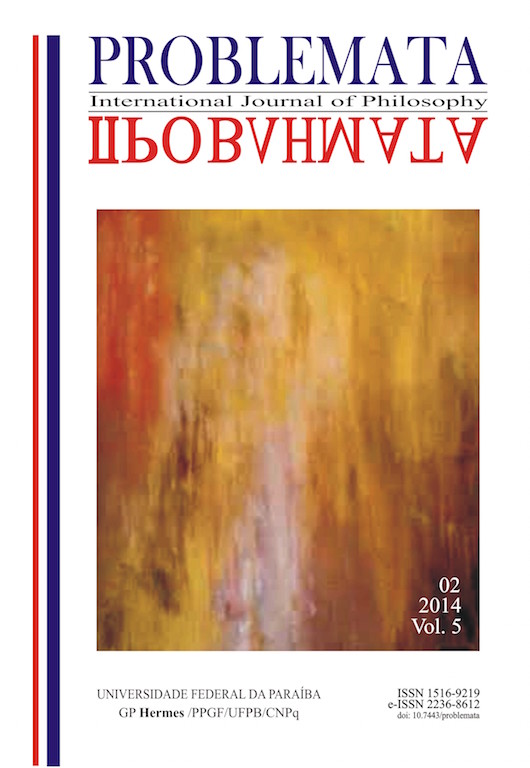O CONHECIMENTO COMO MODO DE SER DO SER HUMANO NA FENOMENOLOGIA HERMENÊUTICA
DOI:
https://doi.org/10.7443/20671Keywords:
Fenomenologia, Hermenêutica, conhecimento, ser-no-mundoAbstract
As reflexões sobre a natureza do conhecimento conduzem, na tradição, a dicotomias, tais como a separação entre o sujeito e objeto, que exigem uma teoria que reaproxime os dois elementos. As teorias do conhecimento são elaborações que procuram fundar e justificar essa relação. Buscamos mostrar que Heidegger, com a sua fenomenologia hermenêutica, na insistência em torno da faticidade e do ser-no-mundo, apresenta uma forma de entender o fenômeno do conhecimento a partir do reconhecimento da condição originária do ser humano, da sua finitude. Neste pensamento dá-se a superação da dicotomia e da exigência de sempre novas fundamentações exteriores ao próprio fenômeno.
[doi:http://dx.doi.org/10.7443/problemata.v5i2.20671]
Downloads
References
D’AGOSTINI, Franca. Analíticos e Continentais. São Leopoldo: Unisinos, 2003.
HEIDEGGER, Martin. Ser y Tiempo. Chile: Editorial Universitaria, 1998.
______. Prolegómenos para una historia del concepto de tiempo. Madrid: Alianza Editorial, 2007.
______. Lógica: la pregunta por la verdade. Madrid: Alianza Editorial, 2004.
______. Zur Bestimmung der Philosophie (Sommersemester 1919). Frankfurt am Main: Vittorio Klostermann, 1999.
______. Phänomenologische Interpretationen zu Aristoteles (Wintersemester 1921/22). Frankfurt am Main: Vittorio Klostermann, 1985.
INWOOD, Michael. Heidegger. São Paulo: Loyola, 2004.
STEIN, Ernildo. Pensar é Pensar a Diferença: filosofia e conhecimento empírico. Ijuí: UNIJUÍ, 2002.
_______. Exercícios de Fenomenologia: limites de um paradigma. Ijuí: UNIJUÍ, 2004.
VON HERRMANN, Friedrich-Wilhelm. Hermeneutik und Reflexion – der Begriff der Phänomenologie bei Heidegger und Husserl. Frankfurt am Main: Vittorio Klostermann, 2000.
Downloads
Additional Files
Published
Issue
Section
License
Authors who publish with this journal agree to the following terms:
- Authors retain copyright and grant the journal right of first publication with the work simultaneously licensed under a Creative Commons Attribution License that allows others to share the work with an acknowledgement of the work's authorship and initial publication in this journal.
- Authors are able to enter into separate, additional contractual arrangements for the non-exclusive distribution of the journal's published version of the work (e.g., post it to an institutional repository or publish it in a book), with an acknowledgement of its initial publication in this journal.
-
- Authors are permitted and encouraged to post their work online (e.g., in institutional repositories or on their website) prior to and during the submission process, as it can lead to productive exchanges, as well as earlier and greater citation of published work (See The Effect of Open Access).





